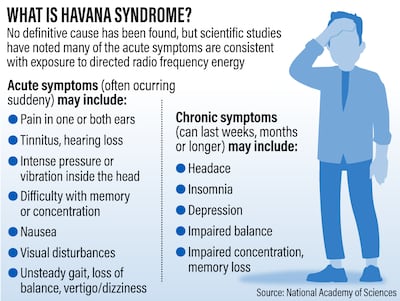Intense directed energy from an external source could have caused some cases of the debilitating Havana Syndrome among US diplomats, US intelligence said on Wednesday.
The mystery illness is thought to have affected hundreds of US officials posted abroad since 2016.
A panel of technological and medical experts convened by the US intelligence community supported the possibility of deliberate attacks.
The panel found pulsed electromagnetic energy and ultrasound, delivered from close distances, could cause the uncommon mix of ear pains, vertigo, nausea and other symptoms first reported by US officials working in Havana, Cuba, in 2016.
The syndrome, which causes symptoms ranging from dizziness to brain damage, still remains a mystery to many.
What is Havana Syndrome?
US embassy staff in Cuba were the first to report symptoms of what came to be known as Havana Syndrome in late 2016. Suspected cases continued to emerge more than five years later, with US investigators unable to pinpoint a definite cause.
Following reports in January of suspected new cases among American diplomats in Paris and Geneva, Secretary of State Antony Blinken said the US still did not know who or what was causing the cases, which were categorised officially as "anomalous health incidents".
He said the US had raised the issue with Russia
What are the symptoms?
People affected by the condition have reported a wide range of symptoms. These include dizziness, nausea, headaches, ringing in the ears, anxiety and memory loss. Some have been so badly affected they have chosen to retire from active service.
In some cases, medical researchers found signs of brain damage.

Mr Blinken said he had met State Department employees around the world who described the illness and how it disrupted their lives.
"There is no doubt in my mind that people have been directly and powerfully affected," he said in an interview with MSNBC on January 13. "We are working overtime across the entire government to get to the bottom of what happened, who's responsible."

Where have people been affected?
Since the first cases in Cuba, there have been reports of Havana Syndrome among US diplomats and intelligence officials in countries including China, Russia, Poland, Georgia and Colombia, in the territory of Taiwan and in Washington itself.
In 2017, diplomats and family members along with intelligence officers stationed in Vienna began experiencing the same symptoms.
The State Department moved employees and their families from the Chinese city of Guangzhou after cases were reported there in 2018.
The CIA has been affected as well. An officer was evacuated from Serbia late last year after suffering serious injuries consistent with Havana Syndrome, while a member of CIA Director William Burns' team had to receive medical attention after reporting symptoms during a visit to India in September.
What could be causing Havana Syndrome?
Out of hundreds of cases reported, "a subset of AHIs (anomalous health incidents) cannot be easily explained by known environmental or medical conditions and could be due to external stimuli," said an unclassified summary of the experts' report released by the US director of national intelligence.
The experts said it is possible to create concealable devices that, using moderate amounts of energy, would direct electromagnetic energy or ultrasound waves to cause damage in a targeted person.
The experts did not say whether such devices exist, nor did they conclude whether such attacks did take place, or suggest who could have been behind them.
But their report pushed back at some claims rejecting the technological possibility of AHI attacks.
The experts rejected other theories of AHI causes, including ionising radiation, chemical and biological agents, infrasound, audible sound, ultrasound propagated over large distances and bulk heating from electromagnetic energy.
